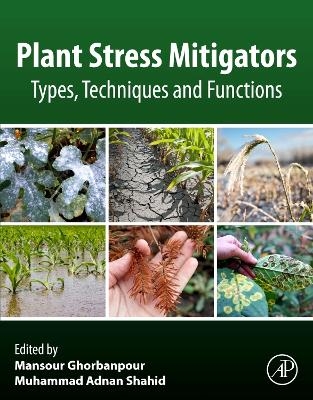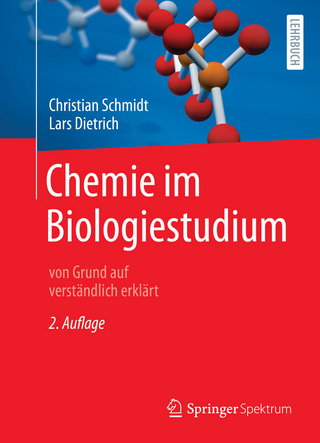
Plant Stress Mitigators
Academic Press Inc (Verlag)
978-0-323-89871-3 (ISBN)
This book combines research, methods, opinion, perspectives and reviews, dissecting the stress alleviation action of different plant stress mitigators on crops grown under optimal and sub-optimal growing conditions (abiotic and biotic stresses).
Dr. Ghorbanpour obtained his MSc. and Ph.D degrees in Crop Ecology from Tehran university (Karaj, Iran), and has been a visiting scholar in the Nutrient Uptake and Toxicity Stress (NUTS) group at the University of Western Australia, Perth, Australia. He specializes in medicinal and aromatic plants production and domestication. His research interests include medicinal plants and their bioactive Ingredients under stressful environments, discovery or development of new therapeutic plants/and products, phytonanotechnology, bioavailability of emerging contaminants in plant-soil systems, agricultural practices/techniques for increasing plant primary and secondary metabolites, Diversity of natural products and bioactive compounds of aromatic medicinal plants, etc. Dr. Ghorbanpour has published over 160 journal articles, 55 book chapters and 12 book volumes. He was listed as “Top 2% scientists of the world in 3 consecutive years (2019-2021) by Stanford University USA Dr. Muhammad Adnan Shahid is a faculty member at the Horticultural Sciences Department, University of Florida/IFAS, North Florida Research and Education Center. Dr. Shahid has also worked at Cornell University and University of Florida, as post-doc and research scientist, respectively. His areas of expertise include plant physiology and biochemistry, nutrient and water management, plant growth regulators, abiotic stresses, and hydroponic/aeroponic systems. Dr. Shahid has published research articles in peer reviewed journals and seven book chapters. He is also serving a reviewer of various scientific journals and serves as co-chair for Northeast Greenhouse of Conference, USA. It is the association of scientist and growers in New England region in USA.
1. Approaches in stress mitigation of plants 2. Biocontrol: a novel eco-friendly mitigation strategy for managing plant diseases 3. Salicylic Acid Induced Abiotic Stress Tolerance in Plants 4. Salicylic Acid Mediated Postharvest Chilling and Disease Stress Tolerance in Horticultural Crops 5. Germination and seedling establishment of useful tropical trees for ecological restoration: Implications for conservation against environmental stresses 6. Soil health and plant stress mitigation 7. Salicylic acid and ascorbic acid as mitigators of chilling stress in plants 8. Role of glycine betaine in the protection of plants against environmental stresses 9. Effects of plant growth regulators on physiological and phytochemical parameters in medicinal plants under stress conditions 10. Proline and soluble carbohydrates biosynthesis and their roles in plants under abiotic stresses 11. Switching role of hydrogen sulfide in amelioration of metal stress in plant 12. PGPR reduces the adverse effects of abiotic stresses by modulating morphological and biochemical properties in plants 13. Role of polyamine in plants under abiotic stresses: Regulation of biochemical?interactions 14. Prime-omics approaches to mitigate stress response in plant 15. Perspectives of using plant growth-promoting rhizobacteria under salinity stress for sustainable crop production 16. Biosaline agriculture coupled with efficient management strategies for sustainable agriculture on salt affected Vertisols 17. Chemical?elicitors- a mitigation?strategy for maximize crop yields?under abiotic stress 18. Role of sulphydryl?bioregulator thiourea in mitigating drought stress in crops 19. Rhizobacterial-Mediated Tolerance to Plants upon Abiotic Stresses 20. Changes in plant secondary metabolite profiles in response to environmental stresses 21. Soil microbial inocula: Eco-solution for mitigating salinity stress 22. How does silicon help alleviate biotic and abiotic stresses in plants? Mechanisms and future prospects 23. Editing genomes to modify plant response to abiotic stress 24. Organic compounds as anti-stress stimulants in plants: responses and mechanisms 25. The influence of climate change on interactions between environmental stresses and plants 26. Biological control of Fusarium wilt in legumes 27. Oxidative Stress in Plants and the biochemical response mechanisms 28. Nanoparticles treatment ameliorate the side effects of stresses in plants 29. Soil moisture-mediated changes in microorganism’s biomass and bioavailability of nutrients in paddy soil 30. Trichomes plasticity of plants in response to environmental stresses 31. An overview of bacterial bio-fertilizers function on soil fertility under abiotic stresses
| Erscheinungsdatum | 12.12.2022 |
|---|---|
| Zusatzinfo | 100 illustrations (50 in full color); Illustrations |
| Verlagsort | Oxford |
| Sprache | englisch |
| Maße | 216 x 276 mm |
| Gewicht | 450 g |
| Themenwelt | Naturwissenschaften ► Biologie ► Biochemie |
| Naturwissenschaften ► Biologie ► Botanik | |
| Naturwissenschaften ► Biologie ► Genetik / Molekularbiologie | |
| ISBN-10 | 0-323-89871-8 / 0323898718 |
| ISBN-13 | 978-0-323-89871-3 / 9780323898713 |
| Zustand | Neuware |
| Informationen gemäß Produktsicherheitsverordnung (GPSR) | |
| Haben Sie eine Frage zum Produkt? |
aus dem Bereich


